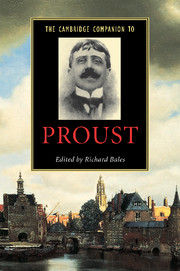Book contents
- Frontmatter
- Introduction
- 1 From Belle Epoque to First World War
- 2 The vast structure of recollection
- 3 Ruskin and the cathedral of lost souls
- 4 The birth and development of A la recherche du temps perdu
- 5 Lost and found: the structure of Proust’s novel
- 6 Proust’s Narrator
- 7 The unconscious
- 8 The texture of Proust’s novel
- 9 Proust’s human comedy
- 10 Proust and social spaces
- 11 Love, sexuality and friendship
- 12 Proust and the fine arts
- 13 Proust and posterity
- Postlude
- Select bibliography
- Index
9 - Proust’s human comedy
Published online by Cambridge University Press: 28 May 2006
- Frontmatter
- Introduction
- 1 From Belle Epoque to First World War
- 2 The vast structure of recollection
- 3 Ruskin and the cathedral of lost souls
- 4 The birth and development of A la recherche du temps perdu
- 5 Lost and found: the structure of Proust’s novel
- 6 Proust’s Narrator
- 7 The unconscious
- 8 The texture of Proust’s novel
- 9 Proust’s human comedy
- 10 Proust and social spaces
- 11 Love, sexuality and friendship
- 12 Proust and the fine arts
- 13 Proust and posterity
- Postlude
- Select bibliography
- Index
Summary
Within the first thirty-five pages of A la recherche du temps perdu, one comic scene threatens the author's entire literary project by calling into question the possibility of communicating through words. In this episode, which directly precedes the drame du coucher, the Protagonist's great aunts, Céline and Flora, attempt to acknowledge the case of Asti wine their neighbour, Charles Swann, has sent them. During the meal, when Flora mentions the friendliness of another neighbour, M. Vinteuil, Céline sees an opportunity to express her gratitude: '“Il n'y a pas que M. Vinteuil qui ait des voisins aimables,” s'écria ma tante Céline' (I, 25) [' “M. Vinteuil is not the only one who has nice neighbours,” cried my aunt Céline' (I, 27/32)]. Flora, determined not to be outdone by her sister, obliquely extends her thanks to Swann after a remark about a maréchal de France resembling a bottle of foolishness: '[j]e connais des bouteilles où il y a tout autre chose' (I, 26) ['I know bottles in which there is something very different' (I, 29/34)]. After Swann’s departure, when the grandfather scolds the sisters for neglecting to acknowledge the gift, Céline expresses her shock: ‘Mais voyons, Swann n’est pas bête, je suis certaine qu’il a apprécié. Je ne pouvais pas lui dire le nombre de bouteilles et le prix du vin!’ (i, 34) [‘Come, come; Swann isn’t a fool. I’m sure he understood. You didn’t expect me to tell him the number of bottles, or to guess what he paid for them’ (i, 39/46)]. Instead of showcasing the women’s mental and verbal agility as they had wished, this comic episode effectively demonstrates the inadequacy of language.
- Type
- Chapter
- Information
- The Cambridge Companion to Proust , pp. 135 - 150Publisher: Cambridge University PressPrint publication year: 2001



